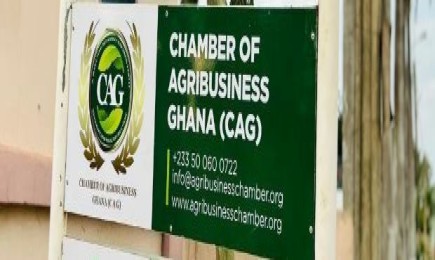adverts
Chamber of Agribusiness Ghana Calls for Nationwide Price Reductions to Ease Burden of High Food Costs on Consumers
The Chamber of Agribusiness Ghana (CAG), led by Chief Executive Officer Anthony Morrison, has issued a strong statement urging all actors in Ghana’s agribusiness and agroindustry sectors to immediately review and reduce their pricing margins to help ease the burden of high food costs on consumers.
According to the Chamber, Ghana’s food system is facing intense pressure, with rising food prices eroding consumer purchasing power, making healthy diets inaccessible for many, and threatening the country’s goals of food security and economic stability.
“The cost of food is now far beyond the reach of ordinary Ghanaians,” the statement said. “This is not sustainable. We must act collectively to prevent a deeper crisis.”
adverts
The Chamber outlined several key reasons why price adjustments across the agricultural value chain are urgently needed:
- Preventing Malnutrition:
With prices of nutritious food such as fruits, vegetables, legumes, and animal products rising, many low-income households are forced to switch to cheaper, less nutritious food options. This leads to malnutrition, micronutrient deficiencies, and long-term health challenges. - Supporting Farmers:
High input costs (fertilisers, seeds, pesticides) discourage farmers from planting or investing in their farms. Many reduce their farm sizes or quit farming altogether. Lower downstream margins can help ensure farmers receive better prices for their produce, encouraging continued production. - Reducing Food Inflation:
Food contributes the most to Ghana’s Consumer Price Index (CPI). Persistent food inflation reduces the value of wages, increases living costs, and pressures central banks to raise interest rates—slowing down economic growth. Lower food prices can help stabilise inflation. - Restoring Consumer Demand:
When a large portion of household income is spent on food, consumers reduce spending on other goods and services. This affects the entire economy. Making food affordable again will help restore balance to the market and stimulate growth. - Driving Operational Efficiency:
The Chamber believes high retail prices often hide inefficiencies such as post-harvest losses and logistical waste. A push to reduce prices would force businesses to review their systems and adopt more cost-effective practices.
While calling on private businesses to adjust prices and operate more efficiently, the Chamber also presented a clear list of actions it expects the government to take in response to systemic issues affecting the food and agriculture sectors.
Input Costs
- Introduce transparent and digitally managed input subsidies (fertiliser and seed) through e-vouchers or direct transfers.
- Support local production of fertiliser and seeds to reduce dependency on imports.
- Establish strategic input reserves and negotiate bulk international purchases.
Storage and Infrastructure
- Build modern, climate-smart storage facilities (silos, cold rooms) through public-private partnerships.
- Encourage use of affordable post-harvest technologies like hermetic bags and solar dryers.
Transportation and Logistics
- Fix and maintain feeder roads that link farms to markets.
- Enforce vehicle load limits to protect roads.
- Invest in rail transport and incentivise the use of fuel-efficient transport options.
Access to Finance
- Expand agricultural financing programmes like GIRSAL.
- Introduce tailored credit schemes for small and medium agribusinesses.
- Regulate lending rates and simplify loan application processes.
Market Information and Coordination
- Create a real-time market information system to help farmers, traders, and transporters plan better.
- Support structured market systems and contract farming to reduce waste and pricing inefficiencies.
The Chamber’s message was clear: Ghana’s food affordability crisis requires urgent and united action from both the private sector and the government.
“To our members and partners—lower your prices where possible. Streamline your operations. Innovate to stay profitable, but remember the burden consumers are facing,” the Chamber urged.
“To the government—implement bold, targeted policies that address the root causes of the crisis. The private sector cannot act alone.”
The Chamber concluded by stating that only through a combined effort can Ghana achieve its vision of a resilient, food-secure, and economically stable nation.
Click the link Puretvonline.com | WhatsApp Channel to join the WhatsApp channel
GOT A STORY?
Contact/WhatsApp: +233243201960 or Email: manuelnkansah33@gmail.com


